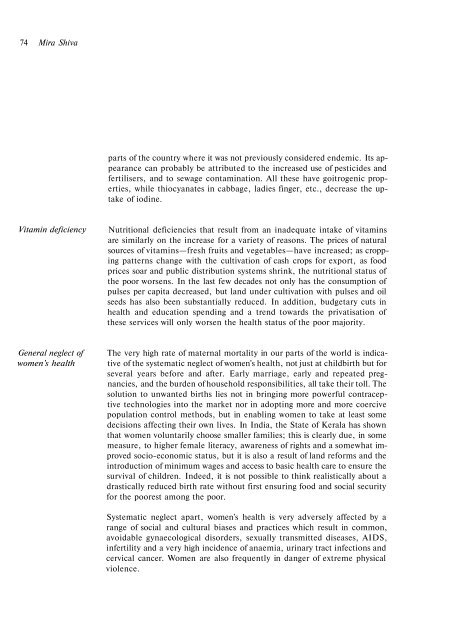Environmental Degradation and Subversion of Health - Dag ...
Environmental Degradation and Subversion of Health - Dag ...
Environmental Degradation and Subversion of Health - Dag ...
You also want an ePaper? Increase the reach of your titles
YUMPU automatically turns print PDFs into web optimized ePapers that Google loves.
74 Mira Shiva<br />
parts <strong>of</strong> the country where it was not previously considered endemic. Its appearance<br />
can probably be attributed to the increased use <strong>of</strong> pesticides <strong>and</strong><br />
fertilisers, <strong>and</strong> to sewage contamination. All these have goitrogenic properties,<br />
while thiocyanates in cabbage, ladies finger, etc., decrease the uptake<br />
<strong>of</strong> iodine.<br />
Vitamin deficiency Nutritional deficiencies that result from an inadequate intake <strong>of</strong> vitamins<br />
are similarly on the increase for a variety <strong>of</strong> reasons. The prices <strong>of</strong> natural<br />
sources <strong>of</strong> vitamins—fresh fruits <strong>and</strong> vegetables—have increased; as cropping<br />
patterns change with the cultivation <strong>of</strong> cash crops for export, as food<br />
prices soar <strong>and</strong> public distribution systems shrink, the nutritional status <strong>of</strong><br />
the poor worsens. In the last few decades not only has the consumption <strong>of</strong><br />
pulses per capita decreased, but l<strong>and</strong> under cultivation with pulses <strong>and</strong> oil<br />
seeds has also been substantially reduced. In addition, budgetary cuts in<br />
health <strong>and</strong> education spending <strong>and</strong> a trend towards the privatisation <strong>of</strong><br />
these services will only worsen the health status <strong>of</strong> the poor majority.<br />
General neglect <strong>of</strong><br />
women's health<br />
The very high rate <strong>of</strong> maternal mortality in our parts <strong>of</strong> the world is indicative<br />
<strong>of</strong> the systematic neglect <strong>of</strong> women's health, not just at childbirth but for<br />
several years before <strong>and</strong> after. Early marriage, early <strong>and</strong> repeated pregnancies,<br />
<strong>and</strong> the burden <strong>of</strong> household responsibilities, all take their toll. The<br />
solution to unwanted births lies not in bringing more powerful contraceptive<br />
technologies into the market nor in adopting more <strong>and</strong> more coercive<br />
population control methods, but in enabling women to take at least some<br />
decisions affecting their own lives. In India, the State <strong>of</strong> Kerala has shown<br />
that women voluntarily choose smaller families; this is clearly due, in some<br />
measure, to higher female literacy, awareness <strong>of</strong> rights <strong>and</strong> a somewhat improved<br />
socio-economic status, but it is also a result <strong>of</strong> l<strong>and</strong> reforms <strong>and</strong> the<br />
introduction <strong>of</strong> minimum wages <strong>and</strong> access to basic health care to ensure the<br />
survival <strong>of</strong> children. Indeed, it is not possible to think realistically about a<br />
drastically reduced birth rate without first ensuring food <strong>and</strong> social security<br />
for the poorest among the poor.<br />
Systematic neglect apart, women's health is very adversely affected by a<br />
range <strong>of</strong> social <strong>and</strong> cultural biases <strong>and</strong> practices which result in common,<br />
avoidable gynaecological disorders, sexually transmitted diseases, AIDS,<br />
infertility <strong>and</strong> a very high incidence <strong>of</strong> anaemia, urinary tract infections <strong>and</strong><br />
cervical cancer. Women are also frequently in danger <strong>of</strong> extreme physical<br />
violence.
















